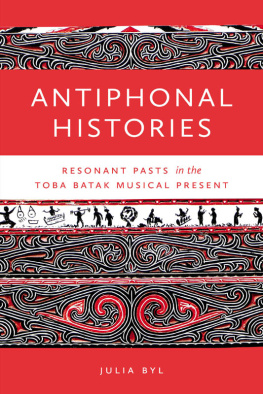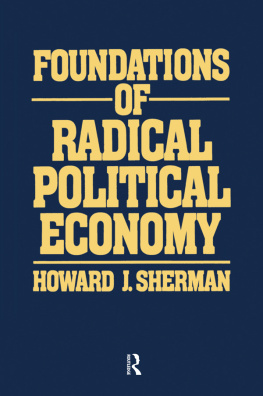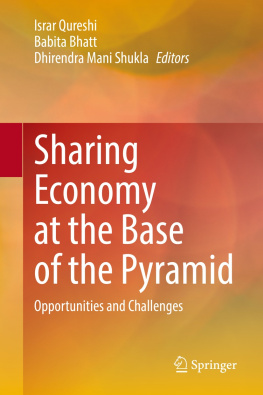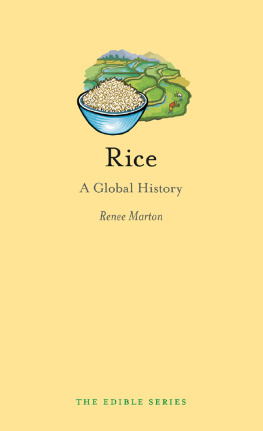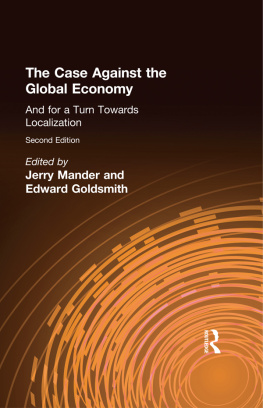Stanford University Press
Stanford, California
1990 by the Board of Trustees of the Leland Stanford Junior University
Printed in the United States of America
CIP data appear at the end of the book
Library of Congress Cataloging-in-Publication Data
Sherman, D. George, 1947-
Rice, rupees, and ritual: economy and society among the Samosir Batak of
Sumatra / D. George Sherman, with the assistance of Hedy Bruyns Sherman.
p. cm.
Bibliography: p.
Includes index.
9780804766630
1. Toba-Batak (Indonesian people)Economic conditions. 2. Samosir Island (Indonesia)Economic conditions. 3. Toba-Batak (Indonesian people)Social life and customs. I. Sherman, Hedy Bruyns. II. Title. DS632.T62S44 1990 305.89922dc19
89-4408 CIP
To Hedy
without whose nurturing and hard work
I would have been unable to do the research,
winnow the findings, and write this interpretation
Unang lupa ho ahu, ito.
Acknowledgments
I could not have written this book if it were not for the aid and long devotion of Hedy Bruyns Sherman. Her visible contributionsthe accompanying drawings, figures, map designs, compiled statistics, botanical references, and many photographsevidence only a small fraction of all her care and assistance.
I was also fortunate in receiving the aid and encouragement of many others. James T. Siegel introduced me to the ethnology of Island Southeast Asia and guided my study of culture and meaning. He and Davydd J. Greenwood, Bemd Lambert, and Benedict R. Anderson contributed many useful observations on earlier drafts (as did the anonymous reviewers). Along with Michael Meeker, A. Thomas Kirsch, O. W. Wolters, and Donald S. Pitkin, they were instrumental in forming my point of view. I of course take full responsibility for the uses to which I have put their teachings or suggestions.
Susan Rodgers, R. Griffin Coleman, P. Voorhoeve, D. van der Meulen, Michael R. Dove, Bruce Koppel, Tsuyoshi Kato, Neil Jamieson, and the late David H. Penny were generous with their knowledge. I am indebted to the Indonesian Council of Scientific Research (LIPI) and to my Indonesian sponsor, Dr. Taufik Abdullah, of the National Institute of Social and Economic Research (LEKNAS), who funded a field assistantship for a year of this study. Sue Rowe, Alan W. Smith, Frans and Julie Leenders, Janneka Frankena, Daniel and Nina Keller, and Margaret Bruyns provided shelter and other help.
Field research was made possible by a grant from the U.S. Department of Health, Education and Welfare under Title VI of the Fulbright-Hays Act, supplemented by the Comell Southeast Asia Program and my parents. The East-West Centers postdoctoral fellowship program, administered by Glenn Shive, and the Resource Systems Institute, under director Seiji Naya, provided encouragement as well as financial and secretarial support and facilities for further research during the first rewriting, as did the Department of Anthropology of Dartmouth College during the final copyediting. Audrey Kahin and Benedict Anderson, who coedited the April 1980 issue of Indonesia in which most of Chapter 7 first appeared, helped greatly in clarifying the prose. Much credit for editing is also due to my editors at Stanford Press, William W. Carver and John Feneron, to their dedicated proofreader, Louise Herndon, and to Deborah Hodges.
The staffs of the School of Agriculture of the University of North Sumatra (USU), the Medan Teachers Institute (IKIP), the Koninklijk Institut voor de Tropen (Amsterdam), the Rijksherbarium (Leiden), and the libraries of Cornell University, Amherst College, and the Universities of Singapore, Massachusetts, Hawaii at Manoa, and of Dartmouth College, were gracious and very helpful.
The text was laid out in Microsoft Word 3.02 on a Macintosh SE. Thanks are due to Robert Brenstein, Jane Evans of the Personal Computer Center at Dartmouth College, Anton Anderson, for , and Helen Mango, for Kroy lettering and map drawing.
In transcribing tape recordings of ritual oratory, I had the help of a very special informant, a drummer, who had been blind from early childhood. Drummers must listen to absolutely everything that is declaimed during dance-dedications at a feast, since they play punctuative tattoos (called reports to God) at significant pauses. This man had honed his power of hearing, to catch the words of feast orations amid the din, for seven years before he agreed to do the same with those I had recorded. My thanks to Pargonsi, the drummer, to the three young men who took on the demanding duties of field assistant, and to the many other villagers and the residents of the surrounding area, who were generous with their time, hospitable with their food and drink, and patient with their explanations.
D.G.S.
A Note on Pronunciation and Orthography
The best guide to pronunciation of Toba Batak words is that given by J. C. Vergouwen:
The stress on a Batak word falls on the penultimate syllable whatever the length of the word, for example dbu, dabu-dbu, dabu-daban, pardabu-dabunon. [Thus Samosir is pronounced Samsir.] The e in words such as bere, dege, lehan, etc., is pronounced as the vowel in break or eight. (1964:4)
In the contemporary spelling, j is pronounced dj, as in jump. The following convention has been adopted in citations of spoken Batak words or phrases that I recorded in writing or on tape: whether or not the original is cited parenthetically in the text, I have used double quotation marks ( ) to indicate a usage of my own in English that is not to be taken as a direct translation of Batak usage. Contrariwise, single quotation marks ( ) in my own expository text indicate my best efforts to give as direct a translation as possible of Batak usage, however much it may strain the English.
Quotation marks in reference to the statements of other writers are double when their words are cited directly. Single quotes are used for a close gloss of others words and intention. Theoretical terms under discussion may also be in double or single quotes. In some cases the quotes are compounded simply to highlight a usage we tend to take for granted.
Further information on the Samosir dialect of Toba Batak may be found in Sarumpaet (1986).
Introduction
The area of northern Sumatra, Indonesia, called Samosir is a large island in Lake Toba and the west coast of the lake crater, including a volcanic cone, Pusuk Buhit, whence the Toba Batak claim to have originated (see Map 1). The Bataks of Samosir had terraced much of the land for rice fields by the time they were colonized by the Dutch in 1906.
Among the most overt effects of colonial penetration are: the cessation of feuding; the conversion of many, though not the majority, of the villagers to one or another Christian denomination; the availability and attraction of education; outmigration; the vastly increased flow of goods (both import of manufactures and export of newly introduced crops and other goods); and the adoption of cash, not only for market transactions but also for many ritual prestations.
This book addresses the questions of whether the set of values that largely shapes the local economy has been fundamentally changed by the widespread adoption of cash or, indeed, by any of the major, overt, social effects of colonial penetration, missionization, and subsequent Japanese and Indonesian administrations.


